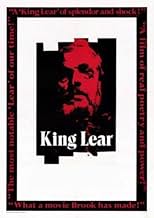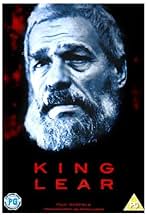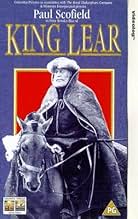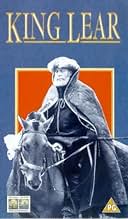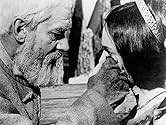IMDb-BEWERTUNG
7,2/10
1001
IHRE BEWERTUNG
Füge eine Handlung in deiner Sprache hinzuKing Lear divides his kingdom among his daughters, giving great importance to their protestations of love for him. When Cordelia refuses to idly flatter the old man, he banishes her and turn... Alles lesenKing Lear divides his kingdom among his daughters, giving great importance to their protestations of love for him. When Cordelia refuses to idly flatter the old man, he banishes her and turns for support to his remaining daughters.King Lear divides his kingdom among his daughters, giving great importance to their protestations of love for him. When Cordelia refuses to idly flatter the old man, he banishes her and turns for support to his remaining daughters.
- Regie
- Drehbuch
- Hauptbesetzung
- Auszeichnungen
- 2 Gewinne & 1 Nominierung insgesamt
Empfohlene Bewertungen
Much reviled at the time of it's release, this heavily cut, Danish
co-production horrified critics with it's bleak as possible take on what
some consider the world's greatest play.
Obviously influenced by nortic flicks from Dryer to Bergman,
Peter Brook shot this as a midevil horror show; and Pauline Kael called
it his "Night Of The Living Dead."
While certainly unfair to the scope of the Bard's vision, the
film is undeniably facinating; though sometimes tedious too. In the best
parts it comes alive with a vivid wickedness, you can certainly see how
Lear's daughter's came to hate his guts!
So, even if it does mutilate a classic, this film is pretty
amazing and highly recommendable. A dark product of it's own time, you
will scarcely see a Lear like this again.
co-production horrified critics with it's bleak as possible take on what
some consider the world's greatest play.
Obviously influenced by nortic flicks from Dryer to Bergman,
Peter Brook shot this as a midevil horror show; and Pauline Kael called
it his "Night Of The Living Dead."
While certainly unfair to the scope of the Bard's vision, the
film is undeniably facinating; though sometimes tedious too. In the best
parts it comes alive with a vivid wickedness, you can certainly see how
Lear's daughter's came to hate his guts!
So, even if it does mutilate a classic, this film is pretty
amazing and highly recommendable. A dark product of it's own time, you
will scarcely see a Lear like this again.
As has happened so many times with the Oscars, another great film-actor-ensemble has been neglected. Recognised nearly universally as the ultimate test of an actor's craft, Paul Scofield as Lear in this 1971 version could be deified for his performance, even more complex than his Oscar-winning Thomas More in 1966's best pic "A Man For All Seasons". Viewing this film should be a prerequisite not just for R.A.D.A. acting students. Incorporating as he did the essence of Lear so organically, Scofield sadly was not even nominated, another nod to the lowest common denominator public taste. This review, nearly forty years after the pic's release, was an on-the-spot spontaneous impulse after yet another viewing of the film. People are afraid of Shakespeare(a.l.a. DeVere); don't be. All, but especially any pained by their own offspring, will turn away from the screen with much more than a penny's worth of thought and a rediscovery of the art of Paul Scofield and ensemble. It is a cliché, but they just don't make movies like this one anymore.
Ah, now for my 100th review, chalked up after roughly four years of semi-regular sly-winking IMDb usury... What better for the "occasion" than a controversial adaptation of perhaps William Shakespeare's finest tragedy?
I watched this as part of my degree work on Shakespeare; I decided to focus on Shakespeare films, tracked down as many as I could and watched a good few. This was the first I viewed, and can I emphasise how contrasting a view of "Lear" it is as compared to Kurosawa's "Ran"? Whereas that film is wilfully expansive and an epic, if not a history, Brook's "King Lear" is a pared down, Beckettian film visualisation of the play. There are very few backgrounds, characters' faces frame so many shots, creating a claustrophobic focus. The interiors that there are are bleak, barren, less than inviting places; there is no sense of a royal grandeur (unlike "Ran") from which Lear falls.
Lear himself is played as an unfeeling, almost robotically callous chap early on, with Scofield delivering the lines in a very restrained, unexpressive way. This is far from the passionate, headstrong character of most performances. He is a husk of a man, and a dulling bully of a monarch, shown by the naturalistic, unbalanced violence he displays when in Goneril's castle. The feeling of Lear, later on in the play as genuinely a "fond" as well as "foolish" man, is downplayed deliberately. Again, the delivery of Shakespeare's poetry is muted. He comes across as perhaps too restrained and passionless in the later stages. The shift from power to impotence is however excellently conveyed during the storm scene, as first we see a shot of Lear from below, which then shifts quickly to one from a bird eye's view Lear has been shown first as in control and central and then rendered a mere insignificant human being, with no control over anything.
Scofield however, does do very well, carrying out this very distanced, disquieting Lear of Brook's instruction, to the letter.
Other actors impress, and are much as restrained; there is little or no actorly show here, the emphasis is on Beckettian delivery of lines, paring down the expression to suggest the futility of expression; words as a mechanical act churned out by humanity, making no difference in a barren, Godless universe. Brook uses Beckett's adage: 'There is nothing to express, nothing with which to express, nothing from which to express together with the obligation to express'. One can well say this is a reductive reading of Shakespeare, but it is spectacularly successful at its perhaps narrow aim. There are countless grounds in Shakespeare's Lear from which such an interpretation is born the play on 'nothing' 'Nothing will come of nothing' and the example of Cordelia's death, which suggest a Godless, reasonless world in its arbitrariness.
Visually, Jack MacGowran and Patrick Magee, notable Beckett actors, make strong impressions, like Scofield, even if their parts are smaller. Susan Engel and Irene Worth are excellent and look just right as Regan and Goneril respectively, whereas a particularly downplayed Cordelia doesn't make much impression - the Christ-like element is absolutely not dwelt upon here, predictably, for what is a nihilistic interpretation.
Peter Brook's film could perhaps be argued to take place in the Dark Ages, but Brook is clearly interpreting the play in a universally, timeless Beckettian sense. One could liken the film's austerity to the Swedish writer-director Ingmar Bergman, but this film is certainly pared down in terms of setting and costume when compared with 'The Virgin Spring' or 'The Seventh Seal'. Brook's approach to Shakespeare shares none of the solace that Bergman finds in humanity in 'The Seventh Seal' with Max von Sydow's Knight's sublime moments with the couple of players. Brook's world-view is clearly informed by the Jan Kott school of Shakespeare criticism; the natural world is a reflection of the human one. Both spheres are bleak and hopeless, as marked by the indiscriminate, desolate Northern landscapes and the equally random acts of cruelty and violence perpetrated by the characters. A complete lack of incidental music suggests Brook is trying not to distract the viewer in any way from the effect he is trying to create.
It has been argued this interpretation is reductive to the play's language, and single-mindedly closes off many avenues in the play Kingship, courtly manners and politics are but a few concerns that are neglected by Brook. Brook's film continually attempts to alienate the viewer, with jarring, incessantly restive camera movement and unorthodox angles. The moment of Gloucester's blinding sees Brook metaphorically blind the viewer to the action by having the screen blank; a Brechtian distancing technique, exposing the artifice of cinema and the subjective power the director has. Brook opts to make the play's usual climax point the Edmund-Edgar duel deliberately anti-climatic. He undercuts any heroism on Edgar's part by making the fight short and brutish, devoid of any skill whatsoever Edgar arbitrarily wins. Likewise, the fates of Goneril and Regan are dispatched with a hurried violence. This 'Lear' ends inconclusively with no hope for the future it does not end directly with Edgar's 'The weight of this sad time' speech, but with the shot of Lear's head tilting back, gradually out of sight against a completely white sky. This expression of emptiness both that Lear is going neither to Heaven or Hell and that things are not likely to get any better or worse.
A very impressive film, that certainly has divided critics. While the "ultimate" film "Lear" may not have been made yet (at least from the ones I have seen), this is a brilliant, bleak, Beckett-informed version. A powerful, wonderfully alienating and stark Shakespeare.
I watched this as part of my degree work on Shakespeare; I decided to focus on Shakespeare films, tracked down as many as I could and watched a good few. This was the first I viewed, and can I emphasise how contrasting a view of "Lear" it is as compared to Kurosawa's "Ran"? Whereas that film is wilfully expansive and an epic, if not a history, Brook's "King Lear" is a pared down, Beckettian film visualisation of the play. There are very few backgrounds, characters' faces frame so many shots, creating a claustrophobic focus. The interiors that there are are bleak, barren, less than inviting places; there is no sense of a royal grandeur (unlike "Ran") from which Lear falls.
Lear himself is played as an unfeeling, almost robotically callous chap early on, with Scofield delivering the lines in a very restrained, unexpressive way. This is far from the passionate, headstrong character of most performances. He is a husk of a man, and a dulling bully of a monarch, shown by the naturalistic, unbalanced violence he displays when in Goneril's castle. The feeling of Lear, later on in the play as genuinely a "fond" as well as "foolish" man, is downplayed deliberately. Again, the delivery of Shakespeare's poetry is muted. He comes across as perhaps too restrained and passionless in the later stages. The shift from power to impotence is however excellently conveyed during the storm scene, as first we see a shot of Lear from below, which then shifts quickly to one from a bird eye's view Lear has been shown first as in control and central and then rendered a mere insignificant human being, with no control over anything.
Scofield however, does do very well, carrying out this very distanced, disquieting Lear of Brook's instruction, to the letter.
Other actors impress, and are much as restrained; there is little or no actorly show here, the emphasis is on Beckettian delivery of lines, paring down the expression to suggest the futility of expression; words as a mechanical act churned out by humanity, making no difference in a barren, Godless universe. Brook uses Beckett's adage: 'There is nothing to express, nothing with which to express, nothing from which to express together with the obligation to express'. One can well say this is a reductive reading of Shakespeare, but it is spectacularly successful at its perhaps narrow aim. There are countless grounds in Shakespeare's Lear from which such an interpretation is born the play on 'nothing' 'Nothing will come of nothing' and the example of Cordelia's death, which suggest a Godless, reasonless world in its arbitrariness.
Visually, Jack MacGowran and Patrick Magee, notable Beckett actors, make strong impressions, like Scofield, even if their parts are smaller. Susan Engel and Irene Worth are excellent and look just right as Regan and Goneril respectively, whereas a particularly downplayed Cordelia doesn't make much impression - the Christ-like element is absolutely not dwelt upon here, predictably, for what is a nihilistic interpretation.
Peter Brook's film could perhaps be argued to take place in the Dark Ages, but Brook is clearly interpreting the play in a universally, timeless Beckettian sense. One could liken the film's austerity to the Swedish writer-director Ingmar Bergman, but this film is certainly pared down in terms of setting and costume when compared with 'The Virgin Spring' or 'The Seventh Seal'. Brook's approach to Shakespeare shares none of the solace that Bergman finds in humanity in 'The Seventh Seal' with Max von Sydow's Knight's sublime moments with the couple of players. Brook's world-view is clearly informed by the Jan Kott school of Shakespeare criticism; the natural world is a reflection of the human one. Both spheres are bleak and hopeless, as marked by the indiscriminate, desolate Northern landscapes and the equally random acts of cruelty and violence perpetrated by the characters. A complete lack of incidental music suggests Brook is trying not to distract the viewer in any way from the effect he is trying to create.
It has been argued this interpretation is reductive to the play's language, and single-mindedly closes off many avenues in the play Kingship, courtly manners and politics are but a few concerns that are neglected by Brook. Brook's film continually attempts to alienate the viewer, with jarring, incessantly restive camera movement and unorthodox angles. The moment of Gloucester's blinding sees Brook metaphorically blind the viewer to the action by having the screen blank; a Brechtian distancing technique, exposing the artifice of cinema and the subjective power the director has. Brook opts to make the play's usual climax point the Edmund-Edgar duel deliberately anti-climatic. He undercuts any heroism on Edgar's part by making the fight short and brutish, devoid of any skill whatsoever Edgar arbitrarily wins. Likewise, the fates of Goneril and Regan are dispatched with a hurried violence. This 'Lear' ends inconclusively with no hope for the future it does not end directly with Edgar's 'The weight of this sad time' speech, but with the shot of Lear's head tilting back, gradually out of sight against a completely white sky. This expression of emptiness both that Lear is going neither to Heaven or Hell and that things are not likely to get any better or worse.
A very impressive film, that certainly has divided critics. While the "ultimate" film "Lear" may not have been made yet (at least from the ones I have seen), this is a brilliant, bleak, Beckett-informed version. A powerful, wonderfully alienating and stark Shakespeare.
Peter Brook has the knack of making his stagings completely his own while at the same time enhancing the character of the play. Thus in "Carmen" he turns it into something of a chamber play, and here in King Lear he stresses the primitivism of the play turning into almost something like a documentary of the dark ages. In especially the first part including the storm he is entirely successful, in spite of the rather experimental expressionism,and the realism of the primitive middle age settings in a landscape of only moors and snows, not a tree in the whole film, is effectively impressing. The actors are superb throughout, and Paul Scofield renders a very interesting interpretation of the old man losing himself with occasional magnificent outbursts of powerful rage. The play is shortened, of course, you can't put all of a Shakespeare play into a film, (I believe the only successful attempt at that was Kenneth Branagh's "Hamlet" and very commendable as such,) while here the text abbreviations unfortunately suffer, the cuts being so obvious. Another flaw is that the articulation is not very good - it was fashionable in the end of the 60s to allow actors to talk on stage like as if they talked naturally, but theatre can't do without rhetoric; and especially with a language like this, which is the very essence of the play, you can't trifle with it, every word has to be pronounced distinctly, or it isn't Shakespeare.
Towards the end the direction gets more sloppy, the intensity loses its grip, while the apocalyptic battle scenes crown the direction. The austere scenery throughout I believe will be what you most will remember of this film adaptation, which couldn't be more impressive, while I think I would prefer the Russian version from about the same time as more convincingly Shakespearian. Since many years I have been waiting for an opportunity to see the Laurence Olivier version from 1983.
Towards the end the direction gets more sloppy, the intensity loses its grip, while the apocalyptic battle scenes crown the direction. The austere scenery throughout I believe will be what you most will remember of this film adaptation, which couldn't be more impressive, while I think I would prefer the Russian version from about the same time as more convincingly Shakespearian. Since many years I have been waiting for an opportunity to see the Laurence Olivier version from 1983.
What's good: Alan Webb's Gloucester and Jack MacGowran's Fool both threaten to steal the picture. Webb is immensely touching in his attempted suicide, but then, I have trouble thinking of a bad Gloucester. Cyril Cusack as Albany and Tom Fleming as Kent should also be praised, and Patrick Magee is creepy as ever as Cornwall.
Henning Kristiansen's cinematography is stunning, rendering Jutland in winter the most inhospitable Learscape ever, and this is the same fellow who shot the lush "Babette's Feast" in the same general location! When Lear and friends are outside being battered by the storm, we see the ungrateful villains inside basking in the warmth of a gigantic roaring fireplace. The visual contrast has never been greater. When Poor Tom's cold, he's really cold in real snow, not just clasping himself and shivering on cue.
Peter Brook's productions often involve wholesale cuts and rearrangements, plus hefty doses of non-authorial content. Yes, this Lear is cut to the bone, the style owes much to Bergman, Beckett, Brecht, etc.
The criminal waste is that Paul Scofield was a major Lear of his generation, and it's gutted here. His magnificent voice is thinned out to a thread, and much of the time the character is distant, veiled and under-energized. His disintegration arouses pity, but no audience involvement. We watch him die from a million miles away, and lose more than we gain with this application of alienation technique.
By the same token, Irene Worth's whispered Goneril is not the volcano we want. For example, she is incapable of expressing lust for Edmund, and that's a crucial omission, not in the text, but in the performance. Two fine actors are caught at considerably less than their best, giving the director what he wanted.
The energy level all around is a bit low, which kills much of what remains of Shakespeare's language, but what really hurts is the leaden pace. Considering half the play is missing, we start slowly, and after Gloucester hits the beach, grind to a complete halt. Entropy is total. Even with the text gutted and filleted, the last half hour of the film feels longer than many complete plays.
For DVD versions with complete texts, don't overlook Jonathan Miller's neurologically-informed production for the BBC with Michael Hordern and Brenda Blethyn. The more mainstream, star-studded Olivier video is an automatic choice for many.
However, another abbreviated version directed by Peter Brook features perhaps the best reading of Shakespeare's Lear of them all, from Orson Welles. This 90-minute condensation from the early days of live television also features Alan Badel, Beatrice Straight and Micheal MacLiammoir. First you must get past the resourceful but limited visuals, two cameras in a single studio running the whole play live without a break. The reward is that no one, no one does Lear's poetry more clearly, simply, powerfully and beautifully than Orson Welles.
Henning Kristiansen's cinematography is stunning, rendering Jutland in winter the most inhospitable Learscape ever, and this is the same fellow who shot the lush "Babette's Feast" in the same general location! When Lear and friends are outside being battered by the storm, we see the ungrateful villains inside basking in the warmth of a gigantic roaring fireplace. The visual contrast has never been greater. When Poor Tom's cold, he's really cold in real snow, not just clasping himself and shivering on cue.
Peter Brook's productions often involve wholesale cuts and rearrangements, plus hefty doses of non-authorial content. Yes, this Lear is cut to the bone, the style owes much to Bergman, Beckett, Brecht, etc.
The criminal waste is that Paul Scofield was a major Lear of his generation, and it's gutted here. His magnificent voice is thinned out to a thread, and much of the time the character is distant, veiled and under-energized. His disintegration arouses pity, but no audience involvement. We watch him die from a million miles away, and lose more than we gain with this application of alienation technique.
By the same token, Irene Worth's whispered Goneril is not the volcano we want. For example, she is incapable of expressing lust for Edmund, and that's a crucial omission, not in the text, but in the performance. Two fine actors are caught at considerably less than their best, giving the director what he wanted.
The energy level all around is a bit low, which kills much of what remains of Shakespeare's language, but what really hurts is the leaden pace. Considering half the play is missing, we start slowly, and after Gloucester hits the beach, grind to a complete halt. Entropy is total. Even with the text gutted and filleted, the last half hour of the film feels longer than many complete plays.
For DVD versions with complete texts, don't overlook Jonathan Miller's neurologically-informed production for the BBC with Michael Hordern and Brenda Blethyn. The more mainstream, star-studded Olivier video is an automatic choice for many.
However, another abbreviated version directed by Peter Brook features perhaps the best reading of Shakespeare's Lear of them all, from Orson Welles. This 90-minute condensation from the early days of live television also features Alan Badel, Beatrice Straight and Micheal MacLiammoir. First you must get past the resourceful but limited visuals, two cameras in a single studio running the whole play live without a break. The reward is that no one, no one does Lear's poetry more clearly, simply, powerfully and beautifully than Orson Welles.
Wusstest du schon
- WissenswertesBrook based this production on ideas expressed by Polish theater critic Jan Kott in the book "Shakespeare, Our Contemporary".
- Crazy CreditsNot only is there no music in the film, but there are no "ambient sounds" at all during the opening credits, giving the impression that they were filmed using no soundtrack whatsoever.
- VerbindungenFeatured in William Shakespeare - Ein Genie und seine Zeit: Folge #1.3 (2023)
Top-Auswahl
Melde dich zum Bewerten an und greife auf die Watchlist für personalisierte Empfehlungen zu.
- How long is King Lear?Powered by Alexa
Details
- Erscheinungsdatum
- Herkunftsländer
- Offizieller Standort
- Sprache
- Auch bekannt als
- Kral Lear
- Drehorte
- Produktionsfirmen
- Weitere beteiligte Unternehmen bei IMDbPro anzeigen
- Laufzeit
- 2 Std. 17 Min.(137 min)
- Farbe
- Sound-Mix
- Seitenverhältnis
- 1.66 : 1
Zu dieser Seite beitragen
Bearbeitung vorschlagen oder fehlenden Inhalt hinzufügen

